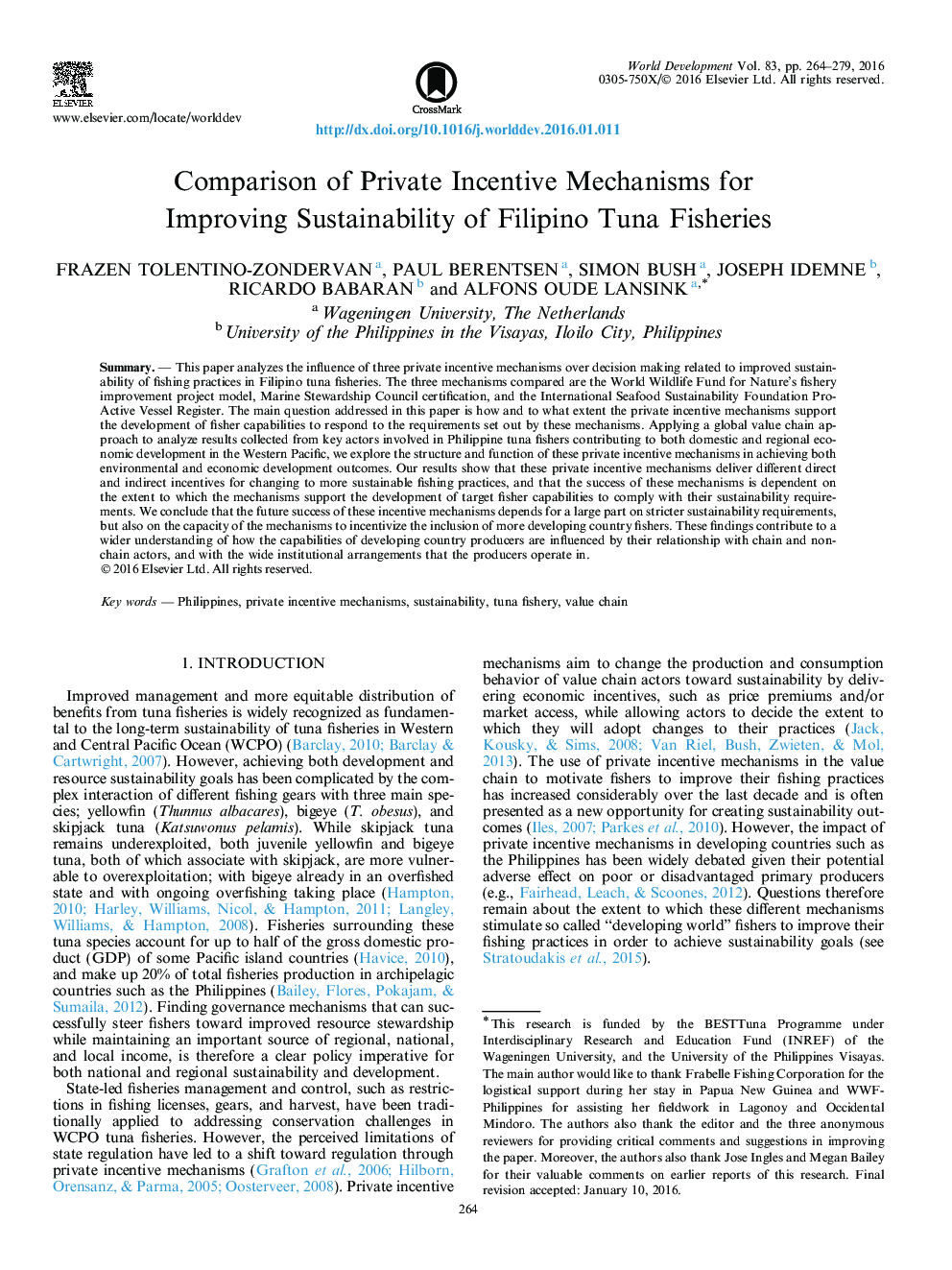| کد مقاله | کد نشریه | سال انتشار | مقاله انگلیسی | نسخه تمام متن |
|---|---|---|---|---|
| 7392748 | 1481135 | 2016 | 16 صفحه PDF | دانلود رایگان |
عنوان انگلیسی مقاله ISI
Comparison of Private Incentive Mechanisms for Improving Sustainability of Filipino Tuna Fisheries
ترجمه فارسی عنوان
مقایسه مکانیسم های انگیزشی خصوصی برای بهبود پایداری شیلاتی طوقه فیلیپینی
دانلود مقاله + سفارش ترجمه
دانلود مقاله ISI انگلیسی
رایگان برای ایرانیان
کلمات کلیدی
فیلیپین، مکانیسم های مشوق خصوصی، پایداری، ماهیگیری ماهی تن، زنجیره ارزش،
ترجمه چکیده
در این مقاله تاثیر سه ساز وکار مشوق خصوصی بر تصمیم گیری مربوط به بهبود پایداری روش های ماهیگیری در ماهیگیری فیلیپینی را بررسی می کند. این سه سازوکار در مقایسه با صندوق جهانی حیات وحش برای پروژه طرح بهبود ماهیگیری طبیعت، صدور گواهینامه شورای نظارت بر دریانوردی و ثبت دامنه فعال پروتئینی پایدار بین المللی غذاهای دریایی است. سوال اصلی مطرح شده در این مقاله این است که چگونه و به چه میزان مکانیسم های مشوق خصوصی، از توسعه توانایی های فیشر برای پاسخگویی به الزامات تعیین شده توسط این مکانیسم ها حمایت می کنند. با استفاده از یک رویکرد زنجیره ارزش جهانی برای تحلیل نتایج حاصل از بازیگران کلیدی ماهیگیران دریایی فیلیپین که به توسعه اقتصادی داخلی و منطقه ای در غرب اقیانوس آرام کمک می کنند، ساختار و عملکرد این سازوکارهای مشوق خصوصی را در دستیابی به نتایج حاصل از توسعه اقتصادی و زیست محیطی بررسی می کنیم. . نتایج ما نشان می دهد که این مکانیزم های مشوق خصوصی، مشوق های مختلف مستقیم و غیرمستقیم برای تغییر شیوه های ماهیانه پایدار تر را فراهم می کنند و موفقیت این مکانیسم ها بستگی دارد به اینکه این سازوکارها از توسعه قابلیت های فیش هدف برای رعایت پایداری آنها حمایت می کنند الزامات. ما نتیجه می گیریم که موفقیت آتی این مکانیزم های انگیزه بستگی زیادی به الزامات پایدار بودن سخت تر دارد، بلکه بر ظرفیت مکانیسم ها برای ایجاد انگیزه از ورود ماهیگیران در حال توسعه بیشتر است. این یافته ها به درک وسیع تر در مورد اینکه چگونه توانایی تولید کنندگان کشور در حال توسعه تحت تأثیر آنها در ارتباط با بازیگران زنجیره ای و غیر زنجیره ای و ساز و کار های سازمانی گسترده ای که تولید کنندگان در آن فعالیت می کنند، تأثیر می گذارد.
موضوعات مرتبط
علوم انسانی و اجتماعی
اقتصاد، اقتصادسنجی و امور مالی
اقتصاد و اقتصادسنجی
چکیده انگلیسی
This paper analyzes the influence of three private incentive mechanisms over decision making related to improved sustainability of fishing practices in Filipino tuna fisheries. The three mechanisms compared are the World Wildlife Fund for Nature's fishery improvement project model, Marine Stewardship Council certification, and the International Seafood Sustainability Foundation Pro-Active Vessel Register. The main question addressed in this paper is how and to what extent the private incentive mechanisms support the development of fisher capabilities to respond to the requirements set out by these mechanisms. Applying a global value chain approach to analyze results collected from key actors involved in Philippine tuna fishers contributing to both domestic and regional economic development in the Western Pacific, we explore the structure and function of these private incentive mechanisms in achieving both environmental and economic development outcomes. Our results show that these private incentive mechanisms deliver different direct and indirect incentives for changing to more sustainable fishing practices, and that the success of these mechanisms is dependent on the extent to which the mechanisms support the development of target fisher capabilities to comply with their sustainability requirements. We conclude that the future success of these incentive mechanisms depends for a large part on stricter sustainability requirements, but also on the capacity of the mechanisms to incentivize the inclusion of more developing country fishers. These findings contribute to a wider understanding of how the capabilities of developing country producers are influenced by their relationship with chain and non-chain actors, and with the wide institutional arrangements that the producers operate in.
ناشر
Database: Elsevier - ScienceDirect (ساینس دایرکت)
Journal: World Development - Volume 83, July 2016, Pages 264-279
Journal: World Development - Volume 83, July 2016, Pages 264-279
نویسندگان
Frazen Tolentino-Zondervan, Paul Berentsen, Simon Bush, Joseph Idemne, Ricardo Babaran, Alfons Oude Lansink,
